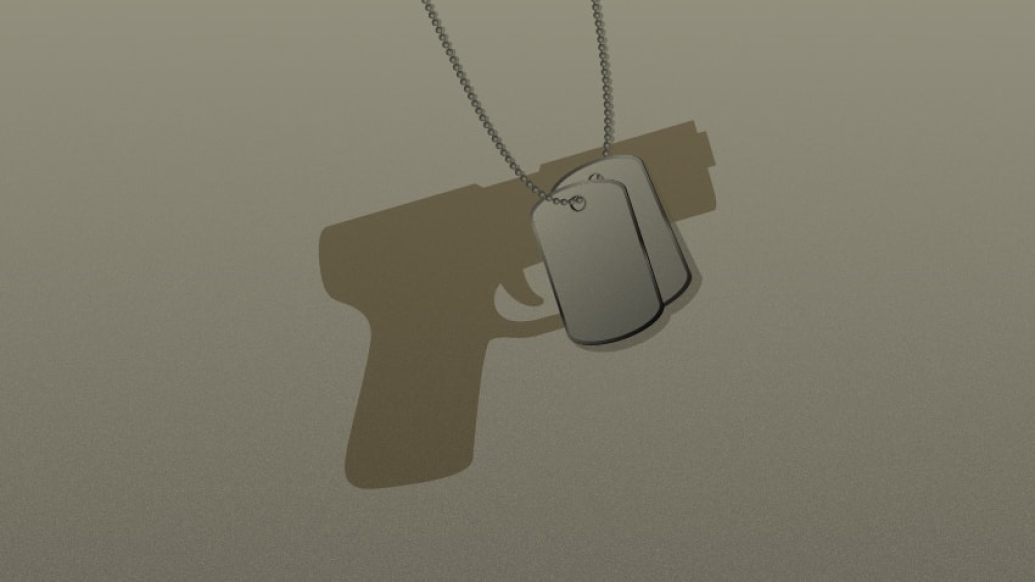Most veterans in VA mental health care approve of voluntary programs to reduce gun access during high-risk periods. What the findings could mean for doctors, patients and families.
7:00 AM
Author |

Every day, 20 veterans across America die by suicide — and most of them use a firearm. New research could help guide suicide prevention efforts for veterans and others.
LISTEN UP: Add the new Michigan Medicine News Break to your Alexa-enabled device, or subscribe to our daily audio updates on iTunes, Google Play and Stitcher.
A survey of 660 veterans who receive mental health care at five Veterans Health Administration centers across the country finds that 93 percent would approve of the Veterans Affairs Department offering at least one option to address firearm access.
Among those options: having health providers ask about veterans' access to firearms, providing gun locks or teaching veterans' family and friends about suicide warning signs and firearm safety.
The survey also found:
-
68.5 percent of those surveyed said they would be in favor of the VA offering gun locks to veterans who have firearms at home.
-
Eighty-two percent thought there were situations when VA clinicians needed to ask veterans about their firearm access; only 7 percent opposed these screenings.
-
Seventy-five percent also favored at least one more intensive effort by the VA to work with patients to voluntarily reduce their firearm access, such as efforts to store or dispose of veterans' guns or to help families secure veterans' guns or gun lock keys.
Full results are published in General Hospital Psychiatry. A team led by Marcia Valenstein, M.D., M.S., of the University of Michigan and the VA Ann Arbor Healthcare System, conducted the study.
Focus on higher risk
In general, veterans are 22 percent more likely to die from suicide than other Americans of the same age and gender.
MORE FROM THE LAB: Subscribe to our weekly newsletter
Which is why the study focuses on the attitudes and views of veterans most at risk of suicide: those already in treatment for mental health conditions, including drug and alcohol problems.
"Veterans in mental health care are in favor of voluntary programs to reduce firearm access during high-risk periods," says Valenstein, a professor emerita in the U-M Department of Psychiatry and a member of the U-M Institute for Healthcare Policy and Innovation and the VA Center for Clinical Management Research.
"This suggests the VA and other health systems should consider working with veterans to develop and implement these programs."
What's more, Valenstein adds, "half of veterans in mental health care indicated if they were suicidal, they would participate in interventions that would substantially limit their own access to their firearms."
Veteran gun owners' opinions
The higher rate of gun ownership among veterans compared with nonveteran Americans is related to the higher rate of suicide, the study's authors say.
More than 45 percent of surveyed veterans said they had a firearm at home, and they were somewhat less likely than those who did not own firearms to support the measures discussed in the survey.
SEE ALSO: Drug and Alcohol Problems Linked to Vet Suicides, Especially in Women
Even so, 82 percent said they would be willing to take part in a program that addressed their access to firearms — and 2 out of 3 said they might or would be open to the VA offering storage and disposal options to limit their access to guns when they might be at higher suicide risk.
Notes Valenstein: "Voluntarily reducing access to these firearms during high-risk periods for suicide, such as periods of increased mental health symptoms, after serious personal setbacks or particularly at times when suicidal thoughts or plans emerge, may reduce veteran deaths."
Message to VA and other clinicians
Valenstein worked with colleagues from U-M, Northeastern University and West Virginia University on the study — including Matthew Miller, M.D., MPH, Sc.D., of Northeastern's Bouvé College of Health Sciences, who has studied firearm-related attitudes and practices among veterans and other groups.
"This study should allay providers' concerns about screening for safe firearm practices, both within the VA and beyond," Miller says. "There is nothing barring you from asking and no reason to think that any other population will be less open to these questions than veterans.
"The results from this survey show that the vast majority are open to conversations about firearm safety, and may well appreciate it."
The findings are especially timely given recent activity on Twitter and beyond among physicians and other health providers using the hashtag #ThisIsOurLane in response to criticism from the National Rifle Association that physicians should "stay in their lane" and not engage on firearm issues.
SEE ALSO: Researchers Launch Website on Firearm Deaths and Injuries Among Children
Veterans are increasingly being cared for by health providers outside the VA system, making the new findings important for non-VA providers, too.
"Not only are clinicians saying this is our lane, but patients recognize that it's in our lane," Miller says. "Given veterans' openness to discussions about their guns and, moreover, to interventions that, by reducing access to guns during high-risk periods, do more to prevent suicide than any other clinical intervention known, the current study reinforces the professional clinical duty to engage in these conversations and to continue to learn how to do so effectively.
"It's an obligation that we can't dismiss."
Valenstein and Miller note that additional research is needed to understand which firearm-related practices and programs would be most effective at reducing the veteran suicide rate. This could lead to evidence-based guidelines for providers and health systems to follow.
In the meantime, they recommend that health care and mental health providers, and others such as clergy and social services providers, take an online course called Counseling on Access to Lethal Means, or CALM, offered by the Suicide Prevention Resource Center.
The research was funded by the VA Health Services Research and Development Service and the VA Center of Excellence for Suicide Prevention. Miller received support from the Joyce Foundation.
Veterans in crisis, and anyone concerned about a veteran, can receive free, confidential support 24 hours a day, seven days a week by calling the Veterans Crisis Line at 800-273-8255 (Press 1), by texting 838255.

Explore a variety of health care news & stories by visiting the Health Lab home page for more articles.

Department of Communication at Michigan Medicine
Want top health & research news weekly? Sign up for Health Lab’s newsletters today!





